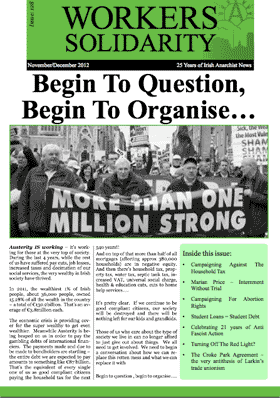Over 30 years of anarchist writing from Ireland listed under hundreds of topics
The CAHWT in Kildare: A locally-led national campaign
Since the foundation of the Campaign Against Household & Water Taxes, WSM members have been pushing for a strengthening of grassroots democracy in the campaign, and we believe that the more democratic the campaign is the more likely it is to succeed. In this article, Brian A., a WSM member involved in the campaign in Kildare, outlines his experience of being involved in building the campaign in his local area.
Mass civil disobedience has happened and will continue to happen until government attempts to extract thousands of Euros from each and every one of us to pay the new taxes have been defeated. Ordinary people, most of whom have no political background, have built a national campaign which has effectively thrown a spanner in the government’s plans.
Had you asked the members of the campaign a couple of years ago what they would be doing in the future, it’s unlikely that they would have said they would be participating in civil disobedience as part of the largest mass campaign since the Land League.
Organising
While the government schemes in Leinster House, the rest of us are meeting in pubs, function rooms and in each other’s homes to organise this national non-payment campaign. The members of a campaign branch discuss and organise every activity from leafleting and doorknocking to protests and fundraising. Motions are discussed and delegates are mandated to carry their branch’s decision to the National Steering Committee (NSC). There is no leadership that gives orders to footsoldiers, we can all have an input into the functions of our branch. The leadership in the CAHWT are the branches themselves, it would not be such a successful campaign if this were not the case.
We don’t wait for decisions to be made by a leadership and then follow them, we do things ourselves. If we decide a public meeting should be held in our area, we know we have to put up posters, advertise online and in local papers, inform supporters, book a room, arrange a speaker, etc. Meeting regularly, branch members volunteer to complete these tasks and report back to the group either during meetings or via email or texts. In this way members can feel ownership of the campaign because it was us that organised that meeting, that march, that picket. No-one did it for us. The value of this DIY approach to social and economic problems is enormous, not least because it is the most effective approach, but also because it’s only through struggle that ordinary people can develop an understanding of their power.
Simple things like ensuring that everyone introduces themselves at the start of the meeting so that everyone knows everyone else, that the meeting chair/facilitator encourages contributions from everyone and tries to ensure that the meeting is not dominated by a small number of people are important. These methods help to develop people’s confidence and ensure that everyone feels comfortable in contributing to the meeting, however small their contribution may be.
Lessons
If we win this campaign, the lesson we must all take to heart is that it was not political activists who won the battle, it was ordinary people. It may be suggested like in the Anti-Water tax campaign in the 90’s that a politician getting elected will win the battle. But getting 3 or 4 sympathetic politicians is not going to make much of a difference. We have to make the collection of the taxes impossible through our non co-operation, our civil disobedience.
If the campaign advances to the point that we are clearly not going to be defeated and are growing ever stronger, the government will back down or change tack but will try to claim that they were against the tax from the beginning but that the Troika wanted it imple- mented. Whatever happens, we must remember that they do that because they are afraid of our collective power and terrified of the possibility of us realising that power. Let’s stop playing their game, on their turf, by their rules. Let’s continue to build the CAHWT as a democratic campaign in which everyone can have a say and ensure that our future is decided by us and not by Phil Hogan and his parasitic class.
This article appeared in
Workers Solidarity 128 - Nov/Dec 2012


